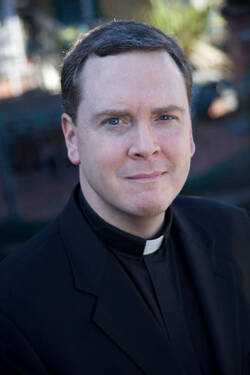They say that tragedies come in threes. This was certainly the case in 1963 for America, by which I mean the magazine and the country. That year marked the passing of three great men, each of whom was beloved in these pages and throughout the world beyond. The Jesuit among them, Father John LaFarge, made a profound and lasting contribution to this magazine. To mark the 50th anniversary of his death, we reprint below an excerpt from “The Manner Is Extraordinary,” by James T. Keane and Jim McDermott, S.J., former associate editors, published in America on Oct. 27, 2008.
On Nov. 26, 1963, in the church of St. Ignatius Loyola in Manhattan, Cardinal Richard Cushing of Boston spoke before hundreds of mourners of the “three Johns” whom the world needed so dearly and yet had lost in recent memory. The first was John F. Kennedy, 35th president of the United States, who had been assassinated four days previous and whose death the nation was still mourning. The second was “Good Pope John,” John XXIII, who had died that June during the proceedings of the Second Vatican Council. The third, and the real subject of Cushing’s eulogy, was John LaFarge, S.J., a famous pioneer in the field of interracial justice and an editor of America for 37 years, including four years as editor in chief, who had died on Nov. 24, 1963.
Almost every prominent figure in the civil rights movement during those troubled times attended LaFarge’s funeral. They came to pay their respects to an unlikely crusader, a man born of the utmost privilege who by virtue of his long discernment and pastoral experience had come to see racial divides and the long history of discrimination against African-Americans in the United States as the crucial issue of the age....
In 1934 he founded the Catholic Interracial Council of New York, which included among its goals the elimination of ignorance regarding race issues, social justice on the model of the old Catholic Action movement and a struggle against Communist inroads.... In 1937, America Press published LaFarge’s most important book on race relations, Interracial Justice: A Study of the Catholic Doctrine of Race Relations, which...laid out a lengthy argument for rethinking American racial attitudes, particularly racist attitudes that blamed the relative lack of African- American intellectual or economic achievements on a supposed inferiority. LaFarge attributed this apparent disparity to the economic and cultural impoverishment that African-Americans had suffered at the hands of the ruling classes in America since their unhappy arrival....
LaFarge’s last book, Reflections on Growing Old, offered him a chance to comment on his status as something of an elder statesman, both among American Jesuits and among larger circles of social progressives.“Old age is a gift,” LaFarge wrote, “a very precious gift, not a calamity. Since it is a gift, I thank God for it daily.” LaFarge died on Nov. 24, 1963, soon after that book’s publication, at the age of 84....
America’s editor in chief at the time, Thurston N. Davis, S.J., wrote of LaFarge’s important influence on the development of the magazine: “ Whatever influence [America has] today, what authority we can muster in the world of the press, we owe largely to this gently dogged priest whose broad sympathy for his fellow man spanned the whole world round and constantly spilled over onto our pages.”









Voila: http://americamagazine.org/issue/685/article/cold-warrior